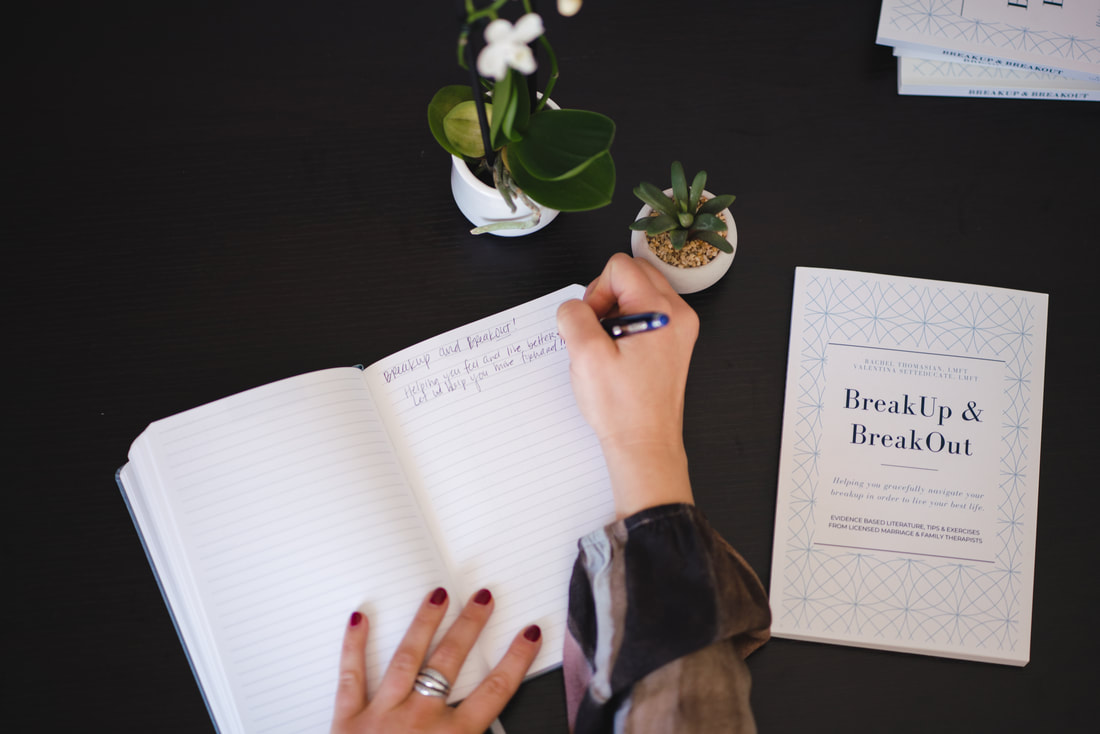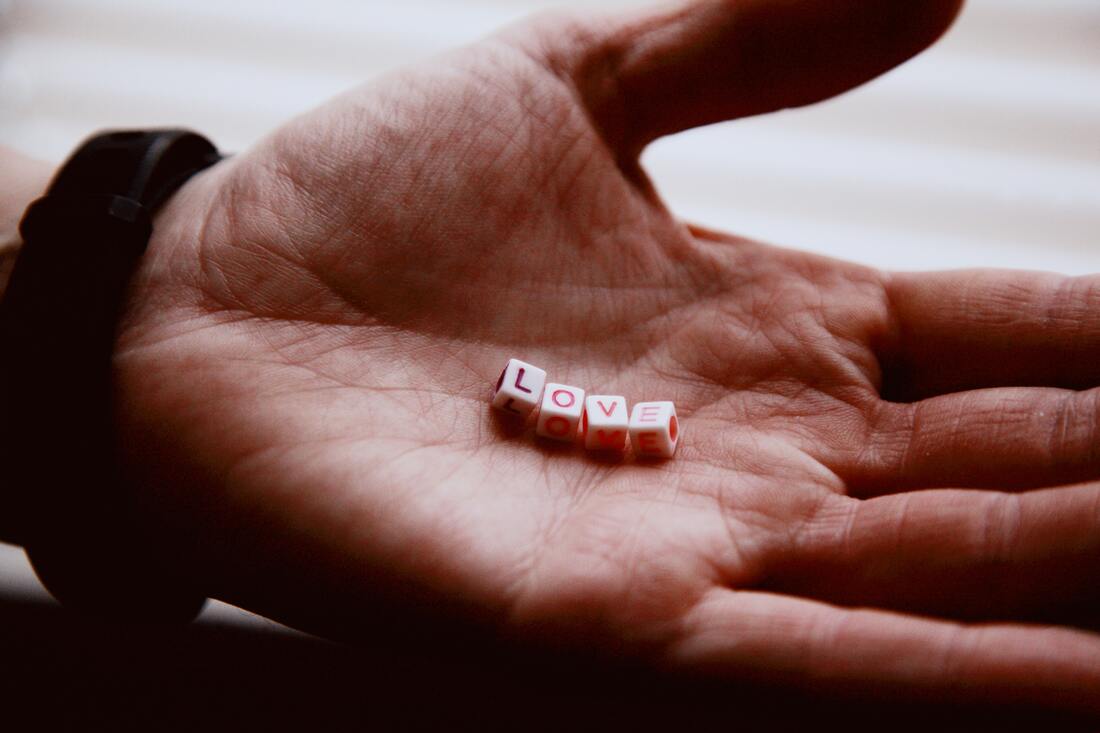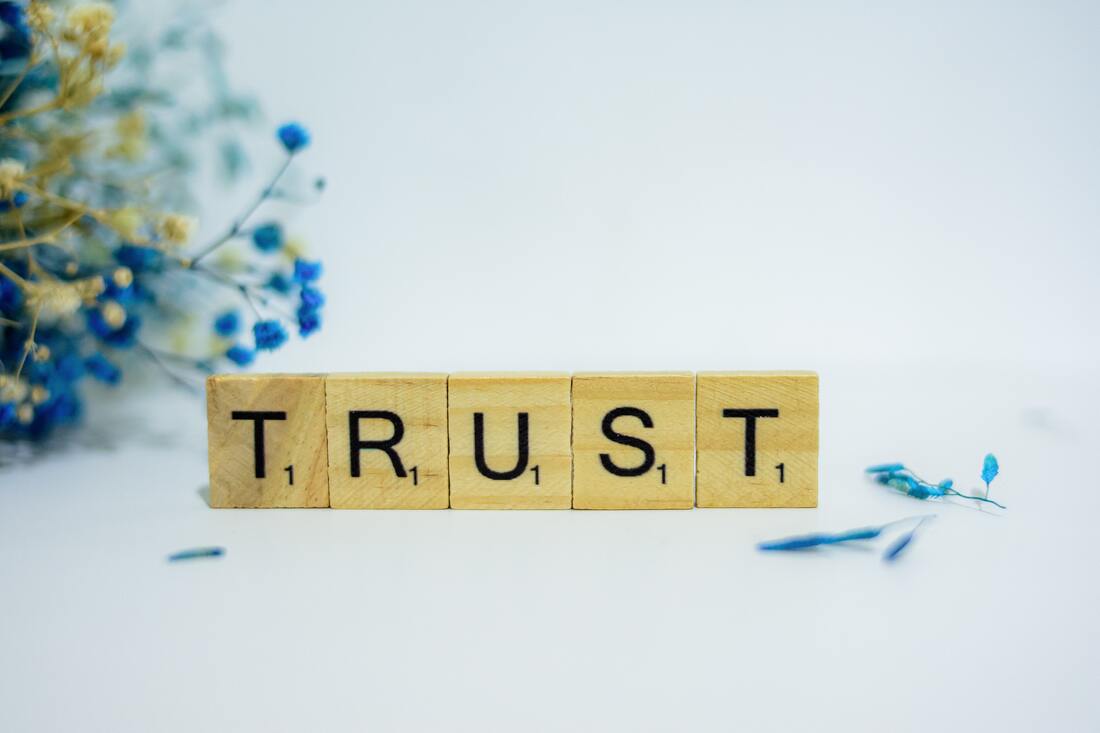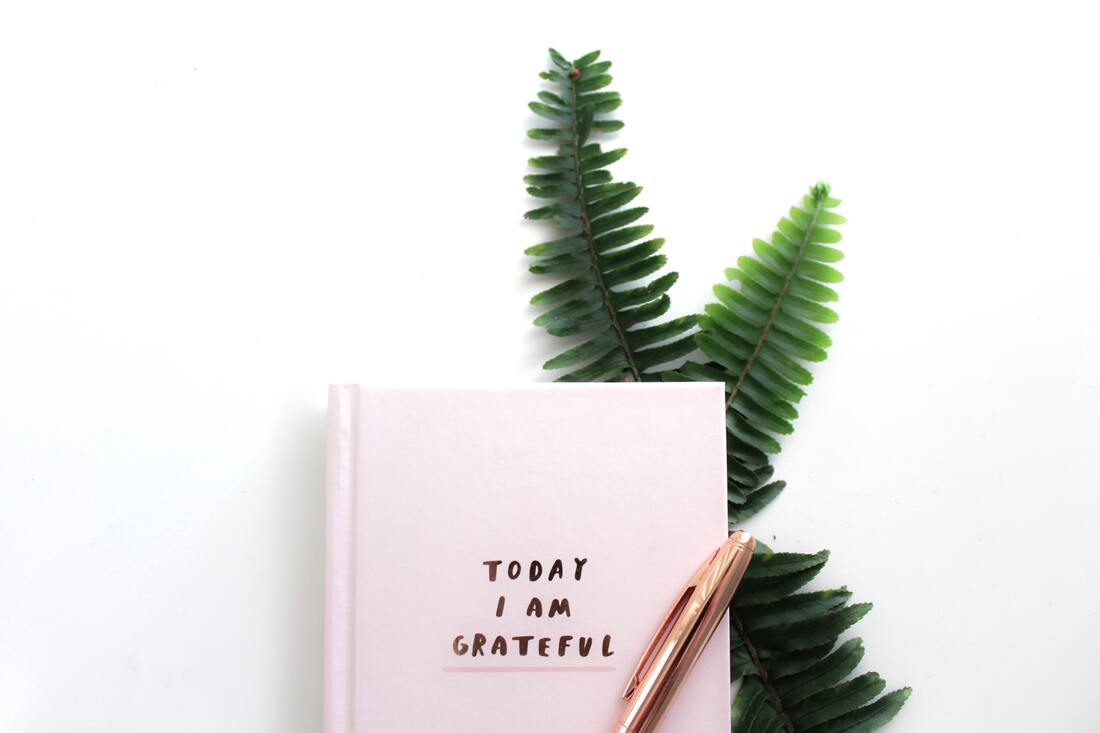|
Breaking up is never easy. It can leave you feeling lost, heartbroken, and unsure of how to move forward. But just because it's challenging doesn't mean you have to stay stuck in the pain. As therapists and breakup experts, the most common question we hear from clients and followers is: "How do you get over a breakup?". Here are 7 actionable steps to help you get over a breakup and start the journey toward healing. The steps outlined here on how to get over a breakup are addressed extensively in our book BreakUp & BreakOut, which we created as a guide to help people healing from a breakup to not just get over a breakup, but thrive!
 A concept we explore when helping people heal after a breakup is learning how to date yourself. In a world that often places emphasis on finding a partner, the concept of dating oneself is a refreshing and empowering notion. While the traditional idea of dating revolves around romantic relationships, there's a growing movement encouraging individuals to explore self-love through the practice of dating oneself. So, why not take a break from the search for "the one" and focus on becoming your own favorite date? Rediscovering Your Passions Dating yourself is not about loneliness; it's a celebration of self-discovery. Take the time to reconnect with your passions and interests. Whether it's a long-forgotten hobby, a creative pursuit, or exploring new activities, spending quality time with yourself allows you to rediscover what truly makes you happy. This self-awareness is invaluable and can lead to a more fulfilling life overall. Cultivating Independence Dating yourself is an opportunity to cultivate independence and self-sufficiency. By enjoying your own company, you develop a strong sense of self, free from the need for external validation. This independence can enhance your confidence, decision-making skills, and overall resilience in the face of life's challenges. Mindful Solo Adventures Solo dates don't have to be limited to staying at home. Embrace the thrill of exploring the world around you independently. Visit a museum, take a hike, or treat yourself to a solo movie night. Engaging in these activities solo not only allows you to set the pace but also encourages mindfulness, as you become fully present in the moment without the distractions of companionship. Self-Care Rituals Dating yourself extends beyond just activities; it involves taking care of your physical and mental well-being. Treat yourself to a spa day at home, cook a delicious meal just for you, or spend an evening with a good book. Nurturing yourself in these ways fosters a deeper connection with your own needs and desires. Building a Stronger Relationship with Yourself In the pursuit of a romantic relationship, it's easy to neglect the most important one of all – the relationship with oneself. Dating yourself is an opportunity to build a stronger, more loving connection with the person you spend every moment of your life with: you. Understanding your values, quirks, and dreams creates a foundation for a healthy self-image and a more authentic connection with others when the time comes. In conclusion, dating yourself is a powerful and transformative practice that goes beyond the superficial aspects of traditional dating. It's about embracing your own company, rediscovering passions, and nurturing a deep connection with yourself. So, go ahead, plan that solo adventure, indulge in self-care, and celebrate the unique and wonderful individual that is you. After all, the most important relationship you'll ever have is the one with yourself.  Healing from a breakup can be a challenging and emotional process. The end of a romantic relationship often leaves us feeling hurt, vulnerable, and lost. However, it is essential to remember that healing is a gradual journey, and with time, patience, and self-compassion, you can emerge stronger and more resilient. We're so passionate about the journey of healing after a breakup, we created the book BreakUp & BreakOut to help people heal from a breakup and learn to thrive in future relationships. Here are some essential steps to help you heal from a breakup:
Breakups are never easy. They can leave you feeling sad, lost, and unsure about what to do next. However, it's important to remember that you're not alone and that there are steps you can take to move forward.
Here are some tips on how to move forward after a breakup: 1. Allow yourself to feel your emotions. It's normal to feel a range of emotions after a breakup, including sadness, anger, and frustration. Don't try to suppress these emotions or pretend that everything is okay. Allow yourself to feel what you need to feel, and give yourself time to process your emotions. 2. Lean on your support system. Whether it's friends, family, or a therapist, having a support system can be incredibly helpful during a breakup. Don't be afraid to reach out to your loved ones and ask for their support. Sometimes just talking things out with someone can make all the difference. 3. Take care of yourself. It's important to prioritize self-care after a breakup. This might mean getting enough sleep, exercising, eating healthy foods, and doing things that make you feel good. Taking care of your physical and emotional well-being can help you feel more grounded and resilient. 4. Reframe your thinking. Instead of focusing on the negatives of the breakup, try to reframe your thinking in a more positive way. Think about the things you learned from the relationship and how you can use those lessons to grow and improve. Focus on the future and the opportunities that lie ahead. 5. Explore new interests and hobbies. One of the best ways to move forward after a breakup is to explore new interests and hobbies. This can help you discover new passions and meet new people. Whether it's joining a book club, taking a cooking class, or starting a new workout routine, trying something new can be invigorating and empowering. 6. Give yourself time. Moving on from a breakup takes time. Don't expect to feel better overnight, and don't rush yourself. Take the time you need to heal and to process your emotions. Be patient with yourself, and remember that things will get better with time. Moving forward after a breakup can be challenging, but it's important to remember that you have the strength and resilience to get through it. By allowing yourself to feel your emotions, leaning on your support system, taking care of yourself, reframing your thinking, exploring new interests, and giving yourself time, you can start to heal and move forward. Dating with intention means that you are not just looking for a casual fling or passing time with someone, but you have clear goals and expectations for your relationship. This approach can help you find a compatible partner who shares your values, interests, and long-term aspirations. In this blog, we will discuss some practical tips on how to date with intention.
1. Be clear about your intentions. The first step to dating with intention is to be clear about what you want from a relationship. Are you looking for a serious commitment, a casual dating experience, or just some companionship? Knowing your intentions will help you find a partner who is on the same page as you. It's essential to communicate your intentions clearly and honestly to avoid any misunderstandings or hurt feelings later on. 2. Define your values and deal-breakers. Another important aspect of dating with intention is knowing your values and deal-breakers. What are the core values that you hold dear, and what kind of behavior or traits would you not tolerate in a partner? Being clear about these things can help you identify potential red flags early on and avoid wasting your time on someone who doesn't align with your values and goals. 3. Take things slow. Dating with intention is not about rushing into a relationship. It's about taking the time to get to know someone and seeing if they meet your expectations and desires. Take things slow, spend time getting to know your partner, and don't rush into making any commitments until you're sure it's the right fit. 4. Have meaningful conversations. Having meaningful conversations is a great way to get to know someone on a deeper level. Ask questions that will help you understand their personality, interests, values, and goals. Discuss your past experiences and future aspirations to see if you're compatible in the long run. 5. Look for compatibility. When dating with intention, it's essential to look for compatibility in all areas of your life. Are you compatible intellectually, emotionally, and physically? Do you have similar values, interests, and life goals? It's important to look for someone who complements your personality and lifestyle. 6. Stay true to yourself. Dating with intention means being true to yourself and your values. Don't compromise on your principles or beliefs to please someone else. Be honest about your thoughts, feelings, and expectations. If your partner doesn't respect your boundaries or values, it may be time to move on. Dating with intention is about being deliberate and purposeful in your search for a partner. By defining your intentions, values, and deal-breakers, taking things slow, having meaningful conversations, looking for compatibility, and staying true to yourself, you can increase your chances of finding a meaningful and fulfilling relationship. Good luck on your journey! Do you ever feel like your partner just doesn't understand you or vice versa? Chances are, the problem could be a mismatch in your "love languages."
What are Love Languages? Love languages are a concept developed by Gary Chapman in his book "The 5 Love Languages." It suggests that everyone has a preferred way of receiving and expressing love, and understanding your own love language and that of your partner can greatly improve your relationship. The 5 Love Languages are:
How to Discover Your Love Language: To discover your love language, consider how you best feel loved and appreciated. What do your partner's actions or words make you feel the most loved? You can also take the love language quiz on Chapman's website. Improving Relationships through Love Languages Once you've discovered your love language and that of your partner, you can use this information to improve your relationship. By speaking your partner's love language, you can show them love in a way that they truly understand and feel appreciated. For example, if your love language is quality time, but your partner's love language is physical touch, try to spend more quality time with them while also being more affectionate. This will show them that you care and understand their love language. Understanding and speaking each other's love languages can greatly enhance your relationship and bring you closer together. Make an effort to discover and speak your partner's love language, and watch your relationship flourish. Self-trust is an essential aspect of our lives. It is the foundation upon which we build our confidence, resilience, and self-esteem. It is the belief in our abilities and the trust in our decisions that allows us to move forward with certainty, even in the face of adversity. However, building self-trust is not always easy. It takes time, effort, and dedication to develop and maintain. Here are some steps you can take to build self-trust:
Transitions and endings can be both exciting and challenging, whether it's changing jobs, moving to a new city, ending a relationship or starting a new chapter in life. While change can bring new opportunities and growth, it can also bring uncertainty and fear of the unknown. However, with the right mindset and tools, you can make transitions and endings a positive experience.
Here are some tips to help you manage transitions and endings smoothly:
Gratitude is one of the most powerful emotions we can experience, and it has been shown to have a profound impact on our mental, physical, and emotional well-being. However, not all gratitude is created equal, and the way in which we express it can make all the difference in terms of its effectiveness. In this blog, we'll explore what authentic gratitude is and how it can enhance our lives. Authentic gratitude is a genuine appreciation for the good things in our lives, regardless of our circumstances. It is a heartfelt, intentional, and honest recognition of the blessings and gifts we have received, and a sincere expression of thanks for them. Authentic gratitude is not simply a rote repetition of thank-you's or an empty recognition of the good things in our lives. Instead, it is a deep, soul-level appreciation that touches us in a profound way.
The Benefits of Authentic Gratitude include:
Healing is a concept that has been around for centuries, with its meaning and methods evolving over time. Traditionally, healing was seen as a way to cure physical illnesses or injuries through medical treatments, such as medications or surgeries. However, in recent years, there has been a shift towards redefining healing beyond just physical health and into a more holistic approach that includes mental, emotional, and spiritual wellbeing.
The holistic approach to healing acknowledges the interconnectedness of the mind, body, and spirit, and how they all contribute to overall wellbeing. This approach recognizes that mental and emotional factors can have a significant impact on physical health and vice versa. As a result, healing is no longer just about treating symptoms, but rather about addressing the root causes of illness or disease. One way to redefine healing is to incorporate complementary and alternative therapies, such as acupuncture, yoga, and meditation, alongside conventional medical treatments. These therapies can help to reduce stress, anxiety, and pain, while also promoting overall wellbeing. They can also help to address underlying emotional or mental issues that may be contributing to physical health problems. Another way to redefine healing is to focus on preventative measures rather than just treating illness. This involves taking steps to maintain good health and prevent disease from occurring in the first place. This can include things like eating a healthy diet, getting regular exercise, practicing stress-reducing techniques, and avoiding harmful habits such as smoking or excessive alcohol consumption. Furthermore, the redefinition of healing should also include addressing the social and environmental factors that can impact health. For example, poverty, lack of access to healthcare, and exposure to environmental toxins can all contribute to poor health outcomes. By addressing these factors, healing can be seen as a collective effort, rather than an individual one. Ultimately, the redefinition of healing requires a shift in mindset, from viewing health as something that can be fixed with a pill or surgery, to understanding that true healing involves a holistic approach that addresses the mind, body, and spirit. It also requires a shift in the way we think about healthcare, from a reactive approach to one that is proactive and focused on prevention. Redefining healing is about recognizing that true health and wellbeing require a holistic approach that addresses physical, emotional, mental, and spiritual needs. By incorporating complementary and alternative therapies, focusing on preventative measures, and addressing social and environmental factors, we can create a more inclusive and effective approach to healing that benefits everyone. |








 RSS Feed
RSS Feed